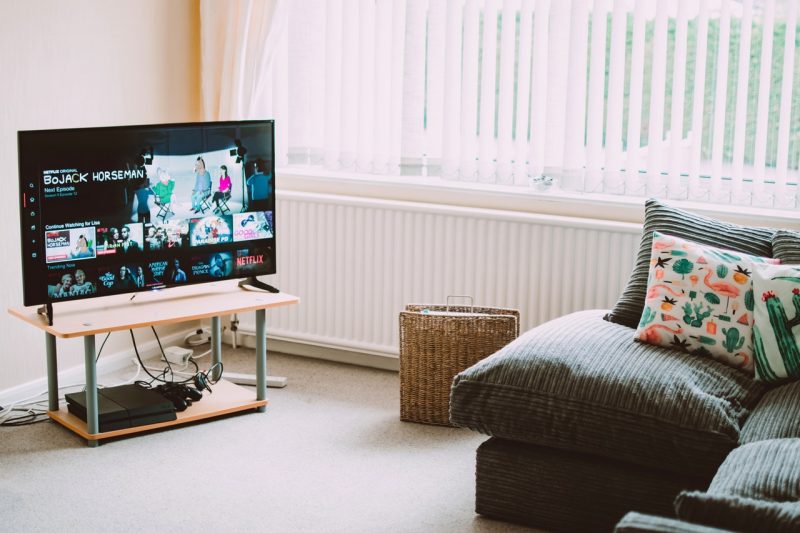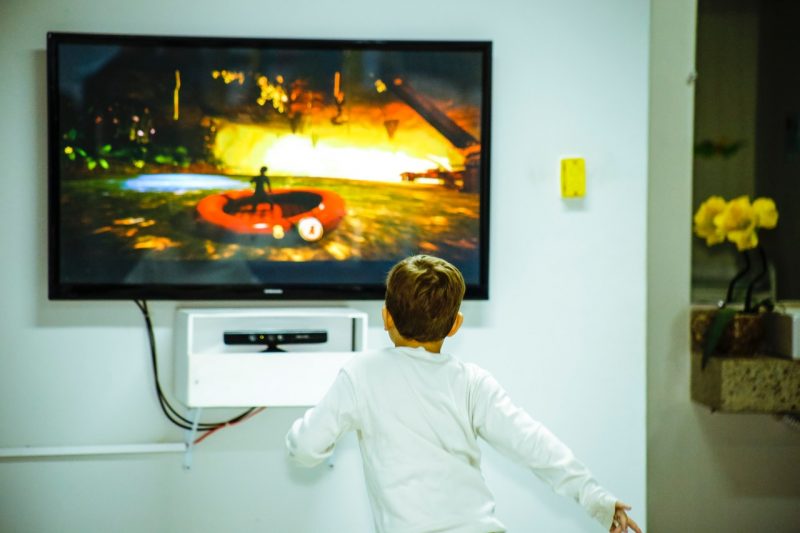
Can you live without watching TV for a week? The answer is probably no. TV has become one of the world’s most popular household appliances, and millions of people are addicted to it. Today, more than 70 per cent of the households in the world own a TV and watch it regularly.
It is the most critical mass medium for entertainment, news, and advertisement. In technical terms, Television or TV is a machine that converts visual images with sound effects into electrical signals, which are transmitted by different means and finally displayed electronically on a screen.
The TV was first invented in the late nineteen twenties by a 21-year-old man named Philo Taylor Farnsworth. But it was not available for regular consumers until the nineteen fifties. Since then, TVs have evolved drastically, and have become bigger and better over the years. In 2010, the smart TV was born, which revolutionized the television industry. Before smart TVs, you would need to have a cable connection, setup box, DVD player, or VCR to watch news channels, TV shows, or your favourite movies.
But since the invention of Smart TVs, Internet television has become the most trending thing. Now you can watch any television programs and movies via the Internet. Smart TVs come equipped with this Internet feature, and there are many streaming services available like Netflix, Amazon, Hotstar, etc., where you will get unlimited content to stream by merely subscribing to your favourite streaming channels.
Over the years, many types of TVs were invented. Some of the most popular types of TVs are Plasma TVs, LCD TVs, and LED TVs. But currently, Plasma TVs and LCD TVs have become outdated, and LED TVs have become the most preferred choice of TVs. That is because LED TVs are more energy-efficient and long-lasting. Recently, another type of TV was also launched in the market, OLED TV.
It is relatively a newer type of TV, but it is a prediction that OLED TVs will replace LED TVs soon. Earlier TVs used to last for decades, but with technological advancement, the life span of TVs has reduced. Nowadays, you can never be sure about how long your TV will last or when will it break down.
What is the average lifespan of TVs?
Before the smart TVs were invented, the traditional TVs used to last for many years and even decades. But since smart TVs with the latest technology have gained popularity, the life span of TVs has decreased. Now if a TV lasts for more than ten years, then it is a significant achievement. Let us see how long should an LED TV last.
Generally, an LED TV, if used at the maximum brightness, has an average life span of 40,000 to 60, 000 hours, which means roughly 5 to 7 years. Nowadays there are LED TVs with a variety of sizes and prices available in the market. You can find an LED TV that comes for Lakhs of rupees, and you can also find an LED TV that occurs for less than Twenty thousand rupees.
So depending on how much money you can afford to spend on your TV, the life span can vary. But mostly the new TV technology lasts for 5 to 7 years. LED TVs have many components, but the LEDs in its backlight are generally going to be the first component to fail.
Another new type of TV is OLED TV. OLED stands for organic light-emitting diode, which is a more advanced version of LEDs. LG is the only major company that is manufacturing these kinds of TVs, and it claims that it will take 54 years before their OLED TV falls to 50 per cent brightness.
Usually, you won’t keep a TV for 54 years, and it is unrealistic to think that a TV has a life span of that long. But OLED TVs have not been around for that long, so there is no way to test their claims. Only time will tell how OLED TVs perform and what will be their average lifespan.
But the idea of the average lifespan is a little vague. It doesn’t matter what the company claims about their TV’s average lifespan, and you can increase it by taking proper care and decrease it by lack of adequate care. To increase your TV life span and ensure it lasts longer, you can use some simple tips that are given below.
Tips to increase your TV’s lifespan and make it last longer:
Nowadays, more and more people are buying the latest TVs because they are smart and more energy-efficient. But to get your money’s worth, you can follow some essential tips given below to make your TV last longer:
- Have proper ventilation

One of the main reasons why TVs don’t last long is because of overheating. Most TVs have their ventilation system behind the screen, so there must be enough free space around it. So if your TV is wall-mounted, then you should at least have a 4-inch gap between its backside and the wall.
The best way to avoid overheating is to place the TV on a table, rather than wall mounting it. Another thing you need to take care of is that the TV should be in an open space, so it cools off by itself, which in turn will increase your TV’s life span.
- Switch off your TV when it is not in use

Many people have a habit of keeping their TVs turned on while they are doing something else in the background. Also, many people fall asleep while watching TV and it remains turned on the whole night.
Although TVs generally have a lifecycle of sixty-five hours, these habits can affect the life span of the TV. Maybe after a few years, you might need to repair it also. Therefore, you should always switch off your TV whenever you are not watching it.
- Never keep the brightness of your TV at the maximum level

Keeping your TV’s brightness at the maximum level can harm its life span. If the intensity is high, more energy will be used, which in turn will add more hours to your TV’s lifespan.
To avoid this, you can change the brightness settings of your TV according to the lighting of your room. Also, a high brightness level can affect your eyes, so it is better to keep the brightness at a reasonable level.
- Always connect your TV with a voltage regulator
Voltage fluctuations in your house can harm your TV and cause severe damage to it. Usually, voltage fluctuates when there is a power cut or bad weather. Even if you are continuously getting power, voltage spikes can happen anytime. It can also be problematic for your TV’s power caps and decrease its life span. So to avoid this problem and make your TV last longer, your TV should be connected to a voltage regulator that will protect it from the voltage fluctuations.
- Adjust your contrast settings

Contrast settings control the difference between the dark and bright colours of the display. If your TV’s contrast settings are set to a high level, its video quality will decrease in few years because it will use more processing power, which in turn will reduce the life span of your TV. To avoid this, you should adjust your TV’s contrast settings to a reasonable level.
- Remove dust and Clean your TV regularly
Dust can harm your TV’s health and reduce its lifespan. Dust can settle on the screen and affect visibility. It can also get into the insides of your TV and make it slow. That is why it is essential to clean your TV regularly. You can do this by using good quality cleaning products on the outsides, and a vacuum machine made for household appliances to clean the insides.
Conclusion
A lot of times, we forget or avoid doing the simplest things, like switching off the television and cleaning the dust particles. Keeping up with the maintenance of your TV is not just crucial for saving repair costs and replacement of parts, but also very important for increasing the life span of the TV and make it last longer.
Currently, many brands manufacture LED TVs, and only LG makes OLED TVs. While OLED TVs are the best type of TVs available in the market, they are very costly, and not everyone can afford one. So if you want to buy an LED TV, you will have a variety of choices, which can make it difficult for you to choose the best one for yourself.
That is why you should get a helping hand from the experts. which will provide you with all the information you need about different TVs in the market, and give you real-life reviews on them from experts, will also recommend the best TV according to your budget or requirements and will make your TV selection process more comfortable.
